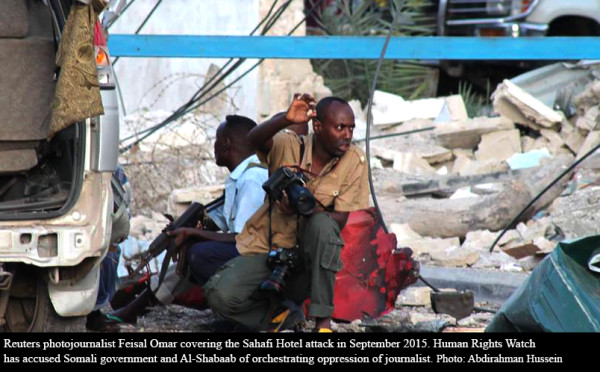Journalists in Somalia suffer government and Al-Shabaab oppression- Human Rights Watch

Journalists in Somalia operate in a state of fear thanks to competing interests between the government and the militant group Al-Shabaab to sway media coverage, Human Rights Watch has said in a report released Tuesday to mark the World Press Freedom day.
In a 74 page report, Like Fish in Poisonous Waters’: Attacks on Media Freedom in Somalia the rights body says the government and Al-Shabaab often times use abusive tactics to manipulate media coverage including killings, threats and arbitrary detention of journalists.
“The Somali federal government and regional authorities have used various abusive tactics to affect media coverage, including arrests and forced closures of media outlets, threats, and occasionally, criminal charges,” the report reads.
Unfavourable reporting
On the other hand, HRW says, Al-Shabaab has targeted journalists as part of its campaign against the Somali government and for reporting deemed unfavorable.
HRW says both sides have exploited the vulnerabilities of the largely unpaid and inexperienced journalists throughout the country’s long conflict. Each side has pressured journalists about their reporting, manipulated casualty figures, and obstructed reporting, greatly affecting the media environment. Dozens of journalists have fled into exile over the last decade, reads the report in part.
HRW Africa researcher Laetitia Bader said the government has done little to protect journalists and instead has been complicit in their oppression. “Media freedom shouldn’t be yet another fatality in Somalia,” said Bader. On top of the long-term threats from Al-Shabab, the new government is increasing the danger and repression for journalists at the very time when their services are most needed.”
Federal and regional authorities have temporarily closed 10 media outlets in 2014 and 2015, the report said.
Expanded free space
But Somalia’s information minister Mohamed Mareye said Tuesday media freedom in Somalia has gradually expanded despite some challenges. “Freedom of expression in Somalia has progressed since I came to office (2014). There are certain problems facing Somali journalists but we have tried to minimise them and they are diminishing,” said Mareye.
In 2015, the New York-based Committee to Protect Journalists (CPJ) ranked Somalia at the top of its list of countries where journalists’ killings go uninvestigated. Since 2014, 10 journalists have been killed in Somalia, four in apparent targeted attacks.
Media law
HRW has also taken issue with the Media Law which was assented to by the president in January. It notes the provisions on prohibition of dissemination of false information, statements and propaganda against the dignity of a citizen, individuals or government institutions as stipulated in Article 29 of the law is vague and subject to abusive interpretation.
“The law does not define any of these offenses. Vague provisions such as these are susceptible to rights-violating interpretation by authorities. As international experts have noted, “vague provisions also fail to provide sufficient notice of exactly what conduct is prohibited or prescribed,” the report said.
The report which is based on among others interviews with 50 journalists makes far reaching recommendations addressed to the ministries of information, justice and information.
It also calls on the president to publicly condemn all attacks against journalists and media organisations. It further recommends all cases of civilians facing trial in military courts be transferred to the civilian criminal justice system.